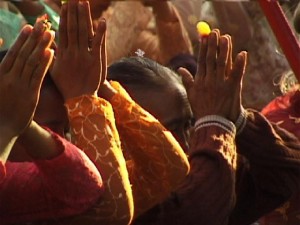The following is an excerpt from a teaching by Jetsunma Ahkon Lhamo called “Essence of Devotion”
The reasons for practice of refuge are known if you understand anything about the horror of cyclic existence. You look outside and see the suffering. You look at the way you are conducting yourself and the way your life is set up and the cause and effect relationships you’ve got going here, and you realize it’s just dumb, fruitless, pointless. There is no future in this. It’s a dead end. At that point the mind turns. That turning is the first step of practicing refuge. What does it turn toward? What does it actually turn toward?
Again, you’ve just looked out the window and you’ve looked at yourself, and the first realization is something like, “I don’t know what to do now. I don’t really know what to do. I know that something is terribly wrong, but I don’t know how to get out of this. I don’t know how to leave the party.” There is a piece of you that understands that you must leave the party. Part of you still wants to be there. Part of you likes to play. Part of you likes to dress up. Part of you likes to be unconscious of the eventuality of your own discomfort—suffering, death, old age, those things—and of the suffering of others. We want to be kind of barefoot and ignorant. Part of us wants that sleep, but another part of us, a stronger part of us, a more certain part of us, understands, “…not enough. It is not enough. I’m hungry. They are hungry. This is stupid.” Part of us gets that.
That first turning is the first indication, the first movement, that is required in practicing refuge. We have to stay kind of absorbed in that turning. That turning should be practiced every day. These very thoughts, these very leaving the party thoughts, should be practiced every day. That’s called turning the mind toward Dharma.
Now we have to look for a way out. How to leave the party? The clue is, once again, the first thing we’ve noticed—the suffering and the trickiness and the seductiveness of samsaric existence, or the cycle of death and rebirth. The cycle of death and rebirth must be addressed. That’s where the suffering is. How do we get out of that? We look at the others suffering. We look at ourselves suffering. We look at how foolish we can be and we think, “What is the method?”
Ah ha! That is the answer! We need a method. The answer to that is to look toward those who have actually found the way out of cyclic existence. In other words, if you want to cross an ocean (and we’re talking about the ocean of suffering, the ocean of death and rebirth, the ocean of samsaric existence),,if you want to cross the ocean of suffering, of course you want to look for a boat. The boat is the method, isn’t it? The boat is the method. Well, wouldn’t you look for a boat? You’re about to cross an ocean. There are no planes. We don’t have planes. You want to look for a boat, right? You’re not going to try to swim it, are you? Swimming it is like saying, “I’d like to be spiritual so I’m just going to be spiritual in my own way and I’ll do my own thing because I’m a really cool guy and I know how to do my own thing.” That’s like saying, “Oh great! I’m going to cross the ocean of suffering. Here I go!” Dive in. How long do you think you’re going to last? A little while, but not very long. Not very long, and the problem with that method is that you often don’t even realize when you’re drowning.
So what we need to do is we need to look for a boat. No, not a boat. We need to look for a ship. In fact, if you’re like me, you’re practical and you really want to protect your hide. You do not wish to cross the ocean of suffering in a rowboat, something weak and puny. Neither do you wish to cross the ocean of suffering in a boat that has not been proven seaworthy—a very important fact, really an important fact. If I were to cross an ocean I would want to know that the boat I am in has crossed an ocean many times and is in good repair. And it’s pure, just in the way it was when it was originally capable of crossing an ocean. We want to know that it’s made it back and forth. This is proven. We know we can make it. Also, if you knew that you were crossing an ocean of suffering with, let’s say, the engineer of the boat, or, let’s say, the guy that swabs the decks… Wouldn’t you be a little nervous? I’d be real nervous! I want to cross the ocean of suffering with the most experienced captain, the one who has crossed the ocean of suffering many times successfully, and returned for me. That’s who I want to cross with. I want the big ship. I want the best ship. I want to know that the captain has crossed.
So in this way we look for the most excellent method, that has proven again and again and again, to produce enlightenment, to produce realization. Not an imaginary enlightenment or realization but the one with appropriate signs, the signs that are repeatable, reportable and visible. Such as the signs that our teachers give us at the times of their death, proof of their realization, and even the signs they give us in their activities during the time of their life. Only enlightened minds can provide enlightened compassionate results.
Copyright © Jetsunma Ahkon Norbu Lhamo. All rights reserved


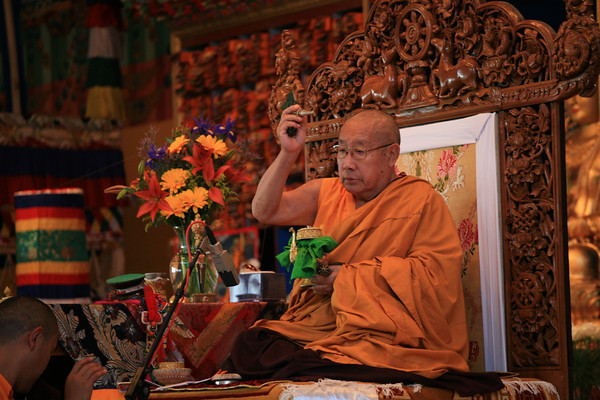
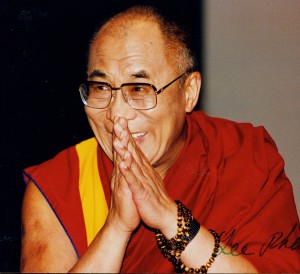
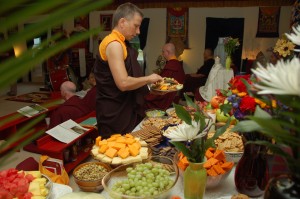
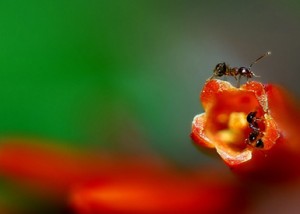


![bodhisattvas[1]](https://www.tibetanbuddhistaltar.org/wp-content/uploads/2010/08/bodhisattvas1.jpg)
